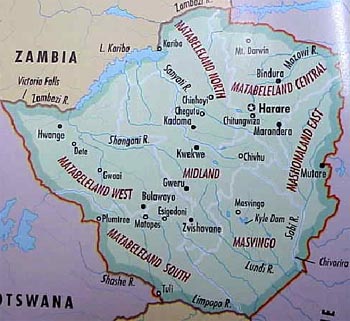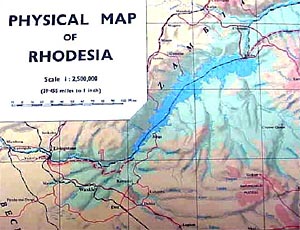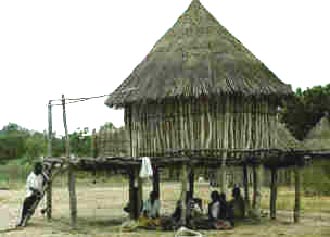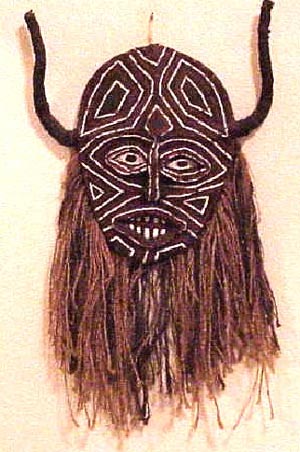|
The
Batonka Tribe of Zimbabwe
(A National Geographic moment relived)
 In 1977, as a young 17 year old
high school graduate from South Africa, and a recently expelled
illegal alien of South Africa returned to Rhodesia, where I was
born, I immediately joined the Armed Forces as a cadet in the
Ministry of Internal Affairs, and was stationed at Binga, on
the edge of Lake Kariba, in Matabeleland Province, where the
original insurgency against the white colonial government of
Ian Smith’s Rhodesia was started back in 1965. It was a
backwater in the terrorist war now, but still lots of action
for a hot blooded young man who knows he is bullet proof and
will live forever. In 1977, as a young 17 year old
high school graduate from South Africa, and a recently expelled
illegal alien of South Africa returned to Rhodesia, where I was
born, I immediately joined the Armed Forces as a cadet in the
Ministry of Internal Affairs, and was stationed at Binga, on
the edge of Lake Kariba, in Matabeleland Province, where the
original insurgency against the white colonial government of
Ian Smith’s Rhodesia was started back in 1965. It was a
backwater in the terrorist war now, but still lots of action
for a hot blooded young man who knows he is bullet proof and
will live forever.
 Map of Map of
Zimbabwe
Close up map of Binga, Victoria Falls, Lake Kariba.
Binga was the administrative capital of the tribal trust lands
for the Batonka people… a very small and primitive tribe
of blacks not associated with the two main tribes of Rhodesia,
the Shona and the Matabele. The Batonka tribe, also known as
the Batonga, were very isolated from civilization, in 1977. The
women I saw, when I first arrived in town, were topless, and
the older ones were all smoking large water pipes made from bulbs.
They were smoking dagga, native grown marijuana, and were the
only tribe in Rhodesia who were legally allowed to do so. The
men were wearing loin cloths, and discarded European clothing,
and all had scars on their cheeks, three vertical scars running
down both sides of their faces, huge holes stretched in their
earlobes which were then hung over their ears, and most had pierced
noses with sticks or bones inserted in them. One man I noticed
immediately upon arrival had a toothbrush through his nose. Both
the men and the women had their front teeth removed, both the
upper and the lower set.
Needless to say, having never been around this tribe before,
(or any tribe like this) I was amazed by everything I saw. When
I questioned my colleques about them, I was informed that it
was a cultural condition brought about by centuries of slavery
by the Arab slavers who used to come up the Zambezi river and
steal all the able-bodied men and women to sell on the action
block. The disfigurement was meant to dissuade the Arab slave
traders from taking them. Even though the slave trade had been
stopped by the British since colonial occupation, the practice
was continued to the present day.
 The Batonka were fishermen, and
traditionally lived on the banks of the Zambezi river in stilted
mud huts, (so the crocodiles wouldn’t get them), catching
their fish with long spears made of wood and barbed points made
from metal. The Batonka were fishermen, and
traditionally lived on the banks of the Zambezi river in stilted
mud huts, (so the crocodiles wouldn’t get them), catching
their fish with long spears made of wood and barbed points made
from metal.
Traditional stilt hut.
When the Rhodesian Government dammed the Zambezi river at
Kariba, creating the largest man made lake in Africa at the time,
Lake Kariba, the Batonka had to be relocated away from the flooding
valleys where they had lived and fished for centuries. At first
they were concerned that they would not be able to continue their
traditional lifestyles, but although some things did change,
they were still able to fish, and subsistence farm as they always
had. Life went on as before. The Batonka were separated by the
damming of the Zambezi river, and entire families were separated.
Some now live in Zimbabwe, and some live in Zambia. The war that
followed U.D.I. kept the families from ever re-uniting.
The women would walk sometimes 20 miles to get water, and
I would see them walking along the road balancing the buckets
of water on their heads, in single file, graceful as models,
and timeless as only Africa can be.
There were many occasions when on patrol when I would be totally
surrounded by local tribes people, who were astonished by the
color of my skin, never having seen a white man before, and they
would come up and touch me, and ask questions of my soldiers
who were with me, about me, why I was white, etc… as they
had never seen a white man before. My men always laughed about
it, saying the natives were uncivilized, and ignorant, unlike
them, who were educated, sophisticated and very worldly. And
these same men, who were 20 to 35 years old, would sit around
the campfires at night wide eyed with astonishment when I told
them about such things as skyscrapers, and cities as big as New
York, and Paris. None of them had been 20 miles outside of Binga.
I only wish I had the forethought to take pictures of all
I saw as I rode and walked around my district during the three
and a half years I was stationed there, but I did not. By 1980,
the war was over, and Zimbabwe became an independent country,
free of its colonial shackles.
I immigrated to California, met and married Jamie, my wife
of now 25 years, became an American citizen, and forgot about
Binga, and the Batonka people I had lived with for such a short
time.
Until 1993, when I took Jamie back to Zimbabwe with me for
a first visit ,after being gone 13 years. How time had flown
by in a flash. I knew nothing would be the same, that my home
town, Bulawayo, which was such a beautiful city when I had lived
there back in 1980, would be different; third world, shabby,
run down, black.
Oh, how wrong I was! I could have gone away for a long weekend,
and come back to a few minor changes, such as street name changes,
street vendors selling vegetables on corners that would never
have been allowed in colonial days, more blacks in town and less
whites. But we never felt threatened, overwhelmed, scared to
be out on the streets, anything. It was wonderful. I loved coming
home. I loved showing Jamie my country, which she had only heard
me talking about. We went all over, to the Great Zimbabwe ruins,
to Victoria Falls, where I spent some of my time during the war.
We sailed on the booze cruise on the Zambezi river, watching
the sun go down and listening to the haunting cry of the fish
eagle. We sat for hours and watched the parade of wildlife at
a waterhole in the incredibly beautiful Hwange National Park.
And at night we lay in bed in our tents while lion walked past
our tents searching for scraps, roaring for hours when they had
a kill about one mile away. (Whew, it wasn’t one of us!).
A year before it was a camper they pulled out of a tent and killed
before being chased off by the game rangers. 
On our next to last day in Bulawayo, we were at the market
in downtown, in the grounds of the city hall, next to the bustling
bus depot, negotiating wood carvings, and stone beads, and straw
baskets to bring home to the States to sell in our bead store,
when we met these three incredibly handsome young men. They were
about 20 years old, very friendly, well educated, trying to sell
us these beautifully painted masks.
They were constructed with raw sticks cut from trees, tied
together, covered with sacking from maize sacks, and painted
in reds, blacks and whites. They frightened Jamie. The young
men told us they were Batonka ceremonial dancing masks, recreated
for sale to the tourists, hand made by them in the area of Zimbabwe
where they live, a small town on the edge of Lake Kariba, called
Binga. Immediately my warning bells went off….these young
men are trying to pull a fast one over us gullible tourists.
They couldn’t possibly know I was an ex Rhodesian, as my
accent had faded, and my accent now was American, (according
to my Mom, who still lives there, I’m a Yank now), so they
wouldn’t know that I would know they should have scars on
their faces, large holes in their ears, and pierced noses, and
missing front teeth. How dare they cheat us like this! So I immediately
confronted them with my knowledge of the Batonka culture, and
how I came by this knowledge. I’ll show them, the rascals.
Now remember, I already explained how nothing much had changed
in 13 years since I had been gone, and when I stepped off the
plane it could have been just a long weekend, it was that surreal.
So when they had stopped laughing enough to explain to me that
that was their parent’s generation, those 13 years came
roaring back really quickly. Of course! Things had starting changing
back in 1980 when I left Binga at the end of the war. The women
were no longer walking around topless. No-one smoked the water
pipes anymore, I remember now that I had stopped seeing sticks
and bones in the noses of the men almost immediately after I
arrived in Binga, and because most of my contact was with older
men and women, not the children, I always saw the scars and ear
stretchings and missing teeth, but in hind sight now, I realized
that the young children never had their teeth missing. I was
seeing those children all grown up now, and it flashed through
me that I had lived through an incredible moment in time, absolutely
a genuine National Geographic moment. Something that most people
would never have the privilege of seeing, and I know I was truly
blessed to have been able to live it for those incredibly short
three and a half years. Because they have gone, and the culture
of that time has gone, and soon, the memory of that time will
be forgotten.
Africa is an incredible continent – visit it, embrace
it, love it. Never forget it.
   |